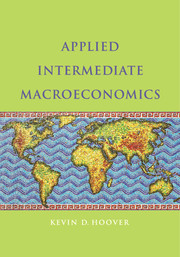Book contents
- Frontmatter
- Brief Contents
- Contents
- Acknowledgments
- To the Student
- To the Teacher
- Part I Introduction
- Part II The National Accounts
- Part III Trends and Cycles
- Part IV Financial Markets
- 6 The Financial System
- 7 The Behavior of Interest Rates
- 8 The International Financial System and the Balance of Payments
- Part V Aggregate Supply
- Part VI Aggregate Demand
- Part VII Macroeconomic Dynamics
- Part VIII Macroeconomic Policy
- Part IX Macroeconomic Data
- Symbols
- Glossary
- Guide to Online Resources
- Index
8 - The International Financial System and the Balance of Payments
from Part IV - Financial Markets
Published online by Cambridge University Press: 05 June 2012
- Frontmatter
- Brief Contents
- Contents
- Acknowledgments
- To the Student
- To the Teacher
- Part I Introduction
- Part II The National Accounts
- Part III Trends and Cycles
- Part IV Financial Markets
- 6 The Financial System
- 7 The Behavior of Interest Rates
- 8 The International Financial System and the Balance of Payments
- Part V Aggregate Supply
- Part VI Aggregate Demand
- Part VII Macroeconomic Dynamics
- Part VIII Macroeconomic Policy
- Part IX Macroeconomic Data
- Symbols
- Glossary
- Guide to Online Resources
- Index
Summary
For good or ill, the world economy is interdependent and becoming more so. The financial system is increasingly able to direct savings in one part of the world toward its most profitable uses in some other part of the world. Yet, the financial crisis of 2008, which started in the U.S. domestic mortgage market, quickly spread to countries: interdependence introduces new risks. Robust foreign trade in goods and services is associated with economic strength and fuels the rapid development of many poor countries. Yet, dependence on trade allows a recession in one country to reduce demand and increase unemployment in other countries. Although these interconnections were introduced in the discussion of national accounts in Chapter 2 and of the financial system in Chapter 6, they present complications that we shall examine more closely in this chapter. In many ways, the world economy is just a bigger version of the national economy. Yet it is complicated by the fact that there are many barriers to international trade, especially in real factors of production, such as labor, and by the existence of different national currencies, which adds considerable complexity to financial markets.
The Global Economy
No component of GDP excites political passions to the degree of net exports – not even government expenditure and its correlative, taxation. In recent years, advocates and opponents of globalization have frequently dominated headlines. “Globalization” generally refers to the increasingly free movement of goods, services, labor, and capital across national borders, increasing international financial integration and the rise of multinational corporations. Globalization has always excited passions.
- Type
- Chapter
- Information
- Applied Intermediate Macroeconomics , pp. 264 - 306Publisher: Cambridge University PressPrint publication year: 2011



